What is the 'real' Rwanda of today?
- Julie Raworth

- Nov 24, 2019
- 14 min read
Updated: Jul 25, 2021
This essay discusses my own thoughts and observations from my most recent trip to Rwanda in September 2019 on the hazards and benefits of development for Rwanda whilst still holding true to their history and culture.
Due to a failed visa application and 6mths delay whilst we appeal, I returned back to Rwanda in September 2019 to visit my husband, but this time with my parents in tow. Their last visit in November 2018 was a fleeting and busy occasion all set around our wedding. My mum in particular wanted to get to know more of Kigali city so this time we rented a house in the city suburbs of Kimironko for a week (much cheaper than a hotel and more privacy and amenities) and balanced the week with resting and getting to know the city better.
For this trip I was now the tour guide for both my parents and my husband. I wanted to show my parents the 'real' Rwanda whilst showing my husband what his country had to offer in terms of leisure and tourism. Even though he works in hospitality he had little hands on experience of the things 'tourists' want to do. Because of this I reflected a lot about how Rwanda balances the past history of the genocide with progression and development, now and in the future. Do they promote themselves through the lense of genocide or are tourists being put off by it. Does this change tourists view of them? Do they want to be known as a country whose name is always linked to genocide or do they want to shed this title and promote what else it has to offer? Through my circle of friends in Rwanda, natives and Brits, I heard about the developing influence of the Chinese who are investing in the infrastructure of Rwanda through road building and industry.
Our first issue before even stepping out of the door of the house was how my husband and my parents negotiated their cultural differences. Being well travelled my parents are respectful of the culture of any country they visit and apply the 'when in rome' philosophy. But now my husband was part of our family and eventually will be so in the UK so both had to adapt their cultures.

In Rwanda it is not acceptable to talk with the in-laws unless they talk to you, particularly prior to the wedding. They would invariably occupy separate rooms in the house on social occassions unless the in-laws instigated communication. Like me, my parents (mum in particular) are more observers and not forthcoming social butterflies that would naturally lead conversations by asking the other their views or opinions. They may comment on their observations but this does not neccasarily invite the other person in.
My husband had many questions for them about how to build a happy marriage and relationship but to him it was not right to ask unless he was invited too by them. So I had to mediate and encourage him to just ask. I made the point that by not doing so it makes it more awkward for them. So between them they both had to overcome their cultural and social awkwardness, which after a few games of cards and Igisoro, and watching my mum get rather tiddly (only seen when she feels comfortable with the company) on coffee liquor, the ice was broken.
I had not realised quite how much my family had relied on me to plan the week until Thursday when all the plans were complete I mentally crashed. But having visited Rwanda as both a tourist and living the everyday life there with my husband it made sense. I also knew what they would enjoy.
Luckily for me they were very much more interested in getting to know the everyday living of the people, to get a sense of how life is there and the feel of the people. I say luckily because, whilst it is rapidly developing, Rwanda is thankfully yet to have become commercially orientated towards tourists apart from gorila trekking. This however needs little promotion as they have hiked the prices up to unachievable amounts for the everyday person to manage the demand. When you google ‘things to do’ in Kigali, after listing all the things I already had on my list, they were scraping the boat by suggesting quiz nights, the casino and horse riding….not what I would deem as typically Rwandan activities, as my husband backed up.
This brought me my first learning about Rwanda for this trip from my husband. Having taught him how to relax and enjoy doing things together such as play cards, be challenged by the traditional game of Igisoro or basket weaving at the womens centre for a morning, we realised that ‘hobbies’ was not a typical thing to have in Rwanda. And so how do they know how to amuse the tourists in leisure pursuits? Priorities for a majority of the population are collecting food and water from the local markets and water pumps, working your land to harvest for market, going to school which may mean walking 5kms for a 7.30am start. Basket weaving, sewing, dress making are all done to sell or dress yourself, not done purely for pleasure as we do.
As my husband also came to realise, when you lose your family you grow up in a limited bubble in which you have created just to survive and so only think to do what those around you are doing. So to just stop for the day and visit Rwanda’s Big 5 was never on his radar.
As mentioned earlier I had to consider how much we wanted or needed to make of the genocide during this trip. Whilst, as I pertained earlier, some Rwandans may say they want to be recognised for who they are now without the label of 'survivors of the genocide'. But I am yet to really hear this. In most conversations with Rwandans it is referenced somehow. Not in a "let's focus on this and feel sorry for us" but in a "it is part of our past culture that we are recovering from and need to be sure to prevent it again in the future". They want to celebrate their survival and recovery and do this they, by default, have to reference the genocide.
Our first day of 'touristing' summed up the balance we negotiated between acknowledging the genocide whilst respecting the progress of the here and now. We paid our respects to the genocide and then visited one of my favourite art galleries full of vibrant and contemporary life.
I decided that, with the genocide being the root of the country that Rwanda is today, my first priority was that my parents truly understood the genocide so that they could view the country, not just seeing them as they are now but by truly knowing where they had come from. This past had to shape every interaction we had with every person we met, be it they were unfamiliar and fascinated with my older parents, they may be scared and suspicious of why we took their photos, they may be excited about what we may bring them that would open up their world. It was not about continually referencing the genocide but truly understanding it and respecting it as part of their story.
From my own experience, it would not benefit them to visit the clinical Kigali Genocide memorial. I had been there and it barely touched me. It serves as a place to pay official respects, as we have the cenotaph. There are rows of beautifully marbled plaques, name lists and plinths. Alleys of information boards to read which can be found on the internet, and a few artifacts curated and displayed under staged lighting and backgrounds to try and portray a sense of what happened. For a first time and brief viewer of Rwanda maybe this is enough. But instead I chose to take them to Ntarama memorial church just 40 minutes south of Kigali.
Here, for the first time the hills start to flatten as we drove through vast rice swamps, a prevalent place for where Tutsis hid and were killed during the genocide. Similar to Nyamata church a little bit further along, it remains a more truthful reminder of the horrors that unfolded that no printed boards of words can express. Unlike Kigali Memorial nothing is hidden, everything is left and preserved as it was found.
I have visited all three memorials and out of them all when I stand inside the church at Ntarama I can do nothing else but sob and apologise. There is a graphic reality in seeing piles and piles of clothes laid out alongside the pews, giving you a stark idea of how many ghosts lay just there, this only being a snapshot of the bigger picture. Personal items have been brought with the families in the belief that this was their future salvation, only for it to be the biggest betrayal of their life.
My mum asked the guide how so much money was left behind, imagining that people would loot them as well as kill them. The one and only agenda at that time of the Hutus was to kill, nothing else was on their mind, no stolen opportunities, apart from raping and violating the women and children to prevent future breeding on the Tutsis.
We hear the stories of Tutsis being attacked by machetes but our imagination cannot stretch to truly comprehend what this really means. At Ntarama we see it in front of us, lines of skulls with blade shaped holes knocked out of them.
Ntarama is more than just the church. It is the Sunday school where the blood remains on the walls, the kitchen where it was burnt down full of people, all being preserved under metal roofing for us tourists to truly ‘feel’ what it must have been like. I don’t know why it is I cry in the church, it is not my imagination that creates it. I just sense the sheer terror and fear they must have experienced.
Below the ground rows of coffins are respectfully and decoratively stored, full of a number of unknown bodies in each box, having to share the dark with others. At least they are not alone now. The candle burns above as the list of names are beautifully carved in marble. A place for respect and peacefulness.
Since visiting last year the complex has developed. New buildings have grown, one to be a museum and education centre, another a counselling centre. Whilst these are very much needed and I understand why they need to be there I felt they now blocked the view of the swamps which play just as an important part of in this whole experience, imagining how so many tutsis would have been running and hiding out there in absolute terror, hearing the screams of others around them.
My parent agreed that this was definitely the most truthful and poignant way to start to comprehend the genocide, and for his second visit my husband was now the stronger of us. But they also agreed that this was now enough and we needed to find something else to do to now celebrate the survival of the country in the present. As we also needed refreshments I opted to take them to the first of the art galleries I like to frequent, Inema Arts Centre.
My favourite gallery is Ivuka because the art is much more raw and doesn't hide from its Rwandan roots, whilst also contemporary and innovative.
At Inema I feel their contemporary styles are in danger of replicating that of Western art. Again the dangers of merging with Western cultures and visitors and focusing on them as the audience to appeal to. Will this start to impact the Arts of the country? How do you stay true to your culture whilst feeding the Muzungas what they want? How do you create art that says something beyond the colours and styles seen in traditional crafts but still stays true to the culture and history?
Whichever art gallery you go too though, the artists are extremely friendly, warm and receiving and at hand to chat with us. At Inema I still love to visit the painted VW Beetles out in the garden. With the offer of a free snack plate of traditional fish, plantain, & mashed avacodo with our coffees it was a lovely light relief.
At the end of the day, whilst we wanted to experience the real life, we were also still tourists so did a bit of gift shopping at a lesser promoted craft market. We found this one previously by accident whilst seeking out Kaplaki craft village where the tourists are usually sent too. I find it offers much more variety, with each little shop featuring something different and many less Muzungos to be exploited so prices are cheaper.
We felt the week had started solidly and well balanced and just driving out and around town already gave my parents a better sense of the life in Kigali. Driving around Rwanda in itself offers so much insight and I am continually found with my camera discretely out of the car window snapping shot after shot. Recently they have introduced a tour bus which, if you are there only breifly, I think is positive in that by driving tourists between the usual tourist spots they also get to see the day to day life of Rwanda.
Because of the weather, trading is very visual as shops fronts are open for all the produce to be seen while there is a continual flow of people hanging around in conversation, or sleepily waiting patiently for a customer, seemingly relaxed in their selling approach....that is until a patron walks in! We did just this to buy fresh frut and vegatables for our self catering. In a small, dark space stacked to the brim of veg there seemed to be at least 3 seperate vendors competing for our custom. As we took veg from each of them we paid one fee for the lot and left them to work out who was owed what out of it. In the dark we also notcied these women were still having to care for their children, as we found a small baby asleep tucked away on one of the bottom shelves amongst the veg. A real life cabbage patch baby!
A tour bus allows tourists to see the variety of architecture beyond the modern skyscrapers currently being promoted commercially through beautiful photos to emphasise the modern developments of Rwanda.
However, the reality is that there is only one area of Rwanda where this infrastructure is, all set around the conference centre and business area where visiting investors will see. They will fly in, be taken to their Hilton hotel, step out into a clean, quiet and modern roads to go to their conference and meetings. They have the Western shopping area all clinically presented to take back their 'souveniers' back for family. They may also take in a concert or sports event at the newly built arena. Is this what Rwanda really want their investors to see?
During the week we got to visit a few friends, local and English and through conversations with them and my husband I learnt more about what was happening in Rwanda regards to development. I met my English friend and fellow therapist on a previous visit when she was volunteering. We have stayed in contact because we are both in a unique position where both UK and Rwanda feel like home. We are able to reflect and compare experiences and discuss the pros and cons of both. She has recently set up her own home here and has taken in 3 young boys as part of their transition from EDD street boys centre. The boys cordially made us dinner from the products they had been growing in their garden and were extremely polite and open to talking about their thoughts with us.
One subject was that of the prevalance of Chinese investments In Rwanda. Major roads are being rebuilt by Chinese companies as they are invested in developing the infrastructure of the new international airport. Whilst on the surface this sounds like an exciting opportunity for Rwanda, underneath what this real means sounds something short of a colonial power. One of the boys has a job at one of the factories. However, they are finding that the Chinese are treating the local workers as amenities that can be disposed of easily if they do not fit with their standards. There are also signs of past Belgium divisions that led to the genocide in the way they are rejecting workers based on their physique. What criteria they are using is unclear but is very much if the face fits. Rwanda needs to be careful in how much power and influence they give to the Chinese as what they appear to be doing is a contradiction to the work of Kagame, of trying to treat each human as equal.
A recent documentary saw Ade Adepitan show the same concerns as he questioned Chinese workers in Zambia. They claim they are not there stealing from the country but are investing in it to also benefit them. But previous records of China in other countries have shown that they use this investment as a form of blackmail, blocking funds to finish projectes unless it is done under their terms. Are they exploiting the vulnerable? But are they only vulnerable because corrupt African nations and government officials have not invested into their own countries themselves? Kagame does not appear to be like this so we can only hope he is keeping a close eye on what the Chinese are doing.
Where I had thought Kagame was doing wonders in creating equality for each individual I am learning that this may not be all it seems either. I had previously learnt that each person is given a piece of land in which they are given a loan for building costs once they are ready to build. But if the government then want to develop a specific area in which their house is on then they are reallocated a new home. Along the road out towards Ntarama church many buildings are marked with a red cross as those that will be redeveloped to make way for the airport traffic. However, my husband has been learning that people are not being reallocated a house that equal the property they already own. So where they may own a 3 bedroomed house for a family of 4/5 they are being given a 2 bedroomed apartment/flat. So are Kagames ideals truly possible in the ruthless world of property development and international investment?
What I am learning about Rwanda is that what is seen to be happening through positive promotion may not be all it seems and that they need to be wary of how they go about developing their country. For any businessperson dipping in and out of the country they are at risk of presuming this that this corporate development is being carried out across the country. Nowhere else in the country am I yet to see similar structures to that around the conference centre area and it took me my third trip there to even come across this area.
It is very easy to take beautiful photos of Rwanda, it is a wonderfully photogenic country. But this also makes it easy to promote as something it may not truly be. The sculptured patchwork hills don't happen naturally. They are the product of thousands of elderly men and women, or children who should be at sschool, farming their own small peice of land, growing crops to sell to stay alive. And the genocide is presented to them in a sterile memorial enabling them to detach from the true horrors of it.
For one time visitors it is thriving, vibrant, warm and welcoming. After a few trips it is still this, and my sense of home has yet to waiver. I love the heart of the real Rwanda that lies behind the Western archicture, even with all it's difficulties. Africa is still laden with corruption at ground level (and I have first accounts of this, being indirectly impacted by it) and Corporate business is still cut throat and ruthless wherever it is done. A huge percentage of the country live in huts in the hills and have to climb down everyday to collect food and water. Whilt we had a water tank in our garden, everywhere we went people were still collecting water in their yellow canisters from a communal water tank.
We also have to be mindful as outsiders about what they are promoting to us. Being seen as 'green' right now gives the country huge international credibility. Whilst I love that they have monthly 'no car', community clean up days, and that they have banned plastic (although seemingly not plastic water bottles), is this just strategic to encourage outside interest and investment. Is this dealing with the everyday problems of the everyday person in Rwanda?
Given it may be my future home it was important I showed my parents all of these perspectives. To show them where the country had come from, where it was now and where it seemed to be heading. We all agreed that whilst so much happening there has got to be good for the people we watch nervously as victims ourselves of a corporate, consumerist and materialist Western society. There is always a place for development. But we feel hugely protective over Rwanda that they don't lose the heart of what makes this country so special to progress.






































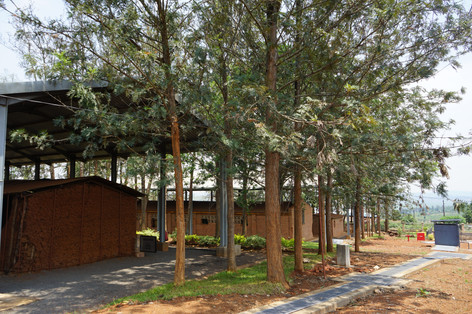













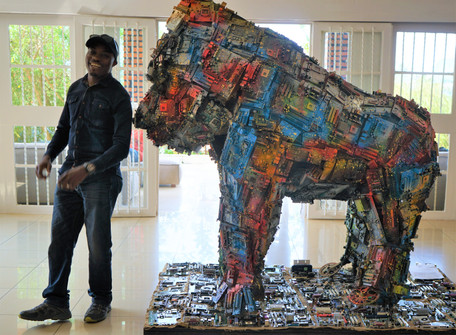



























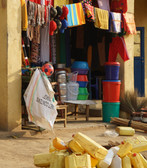











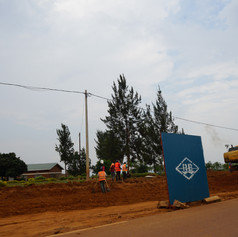









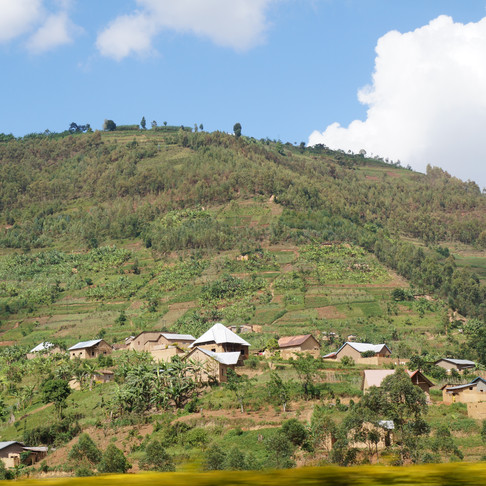

















Comments